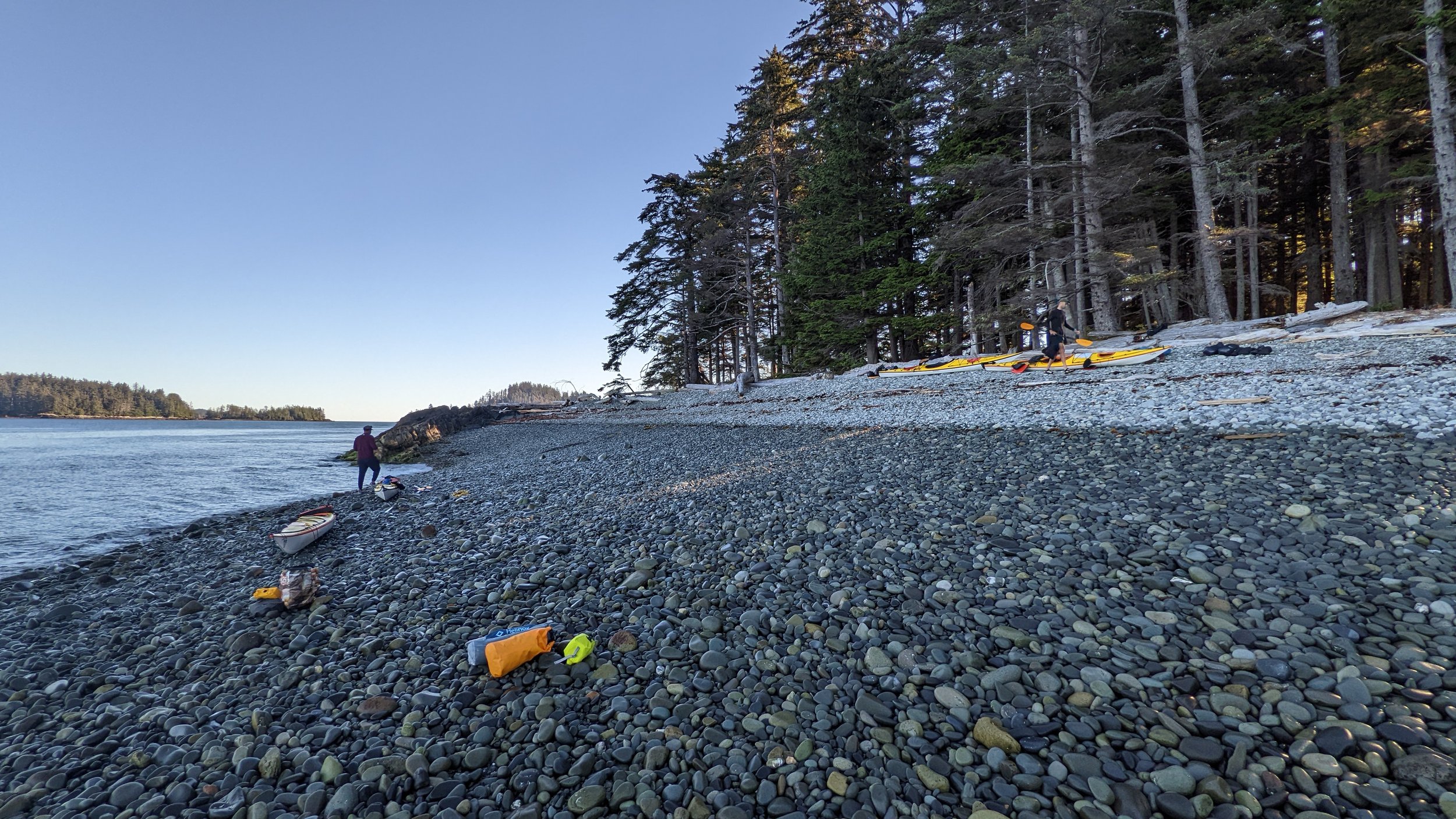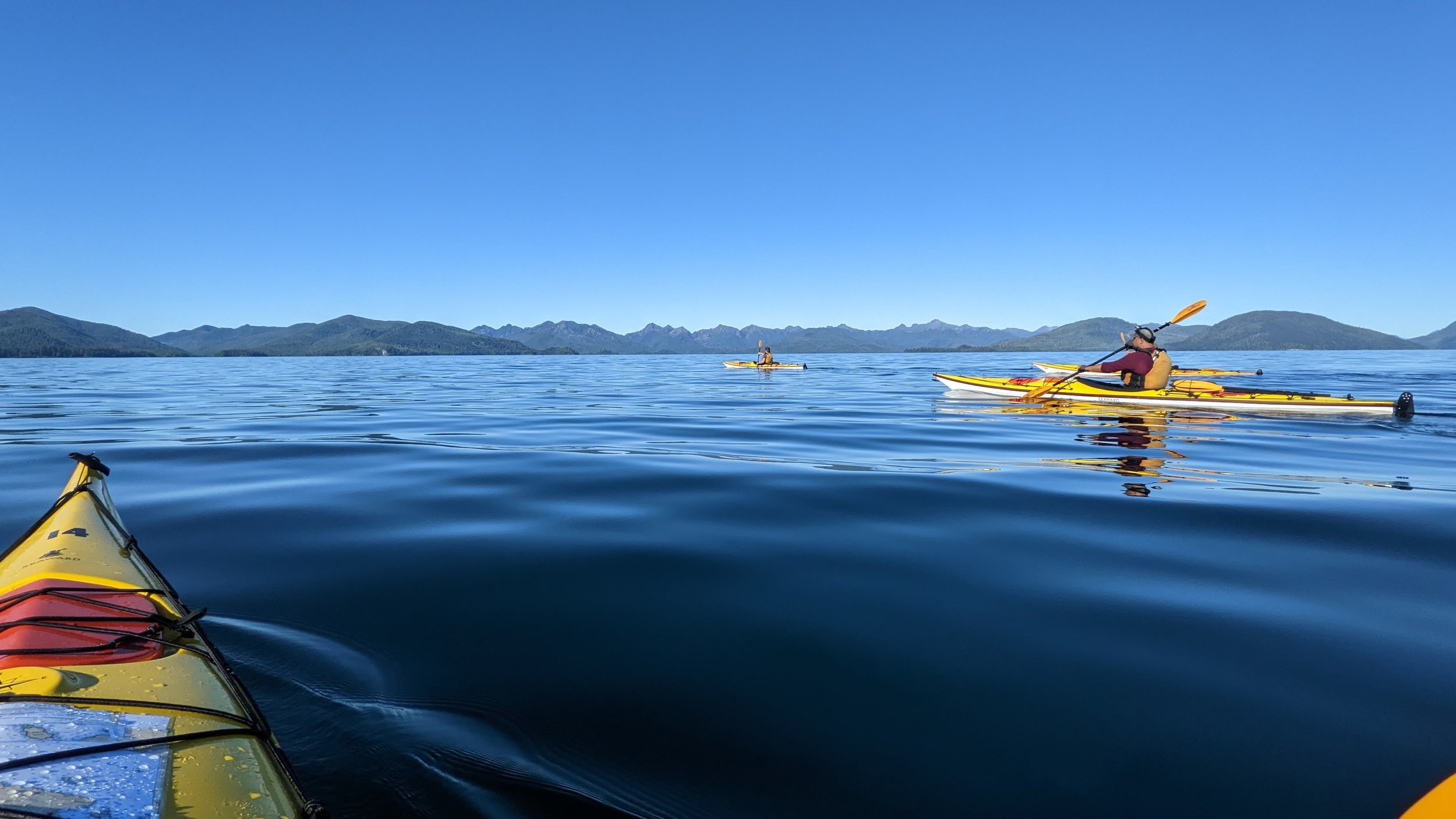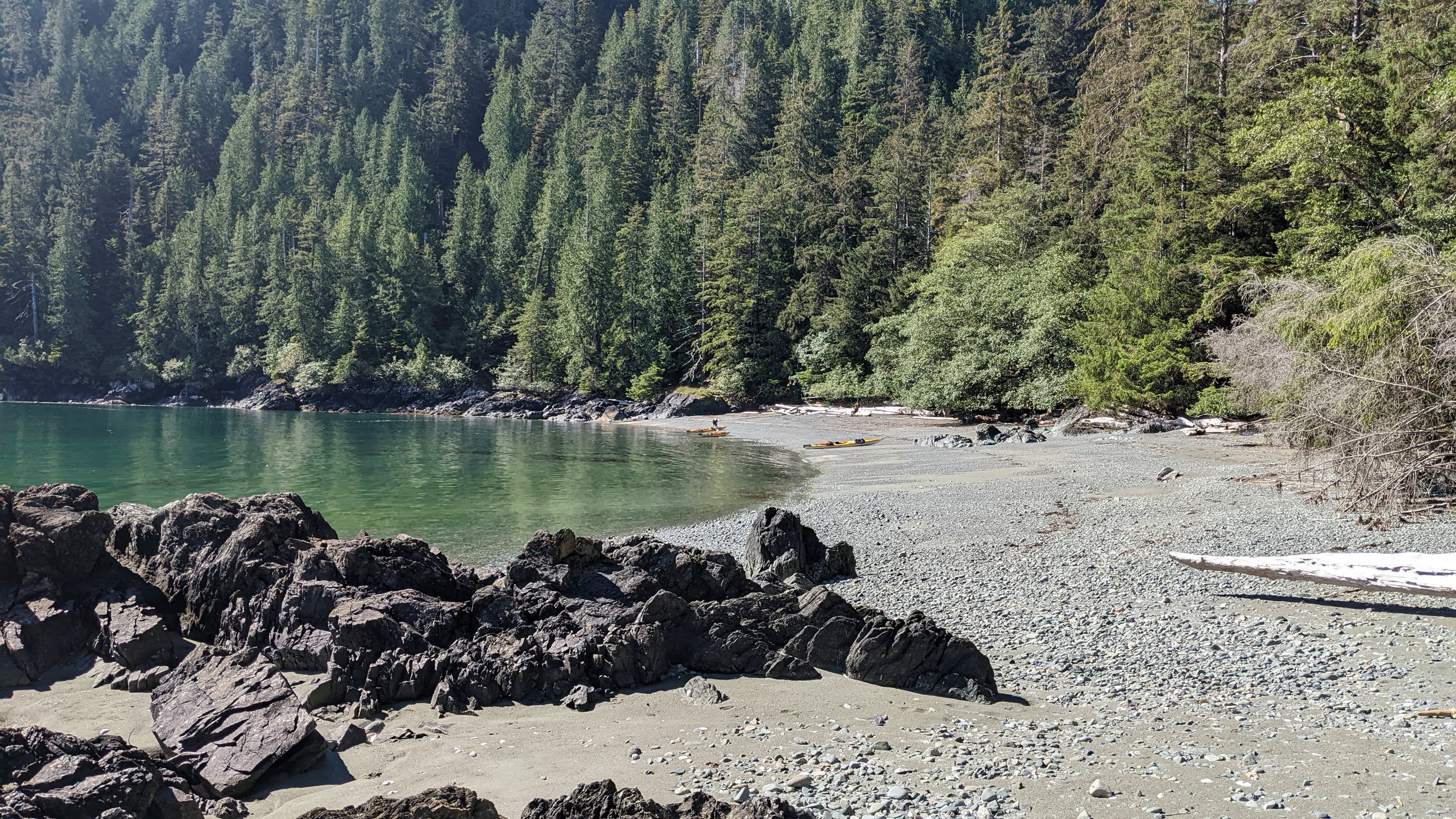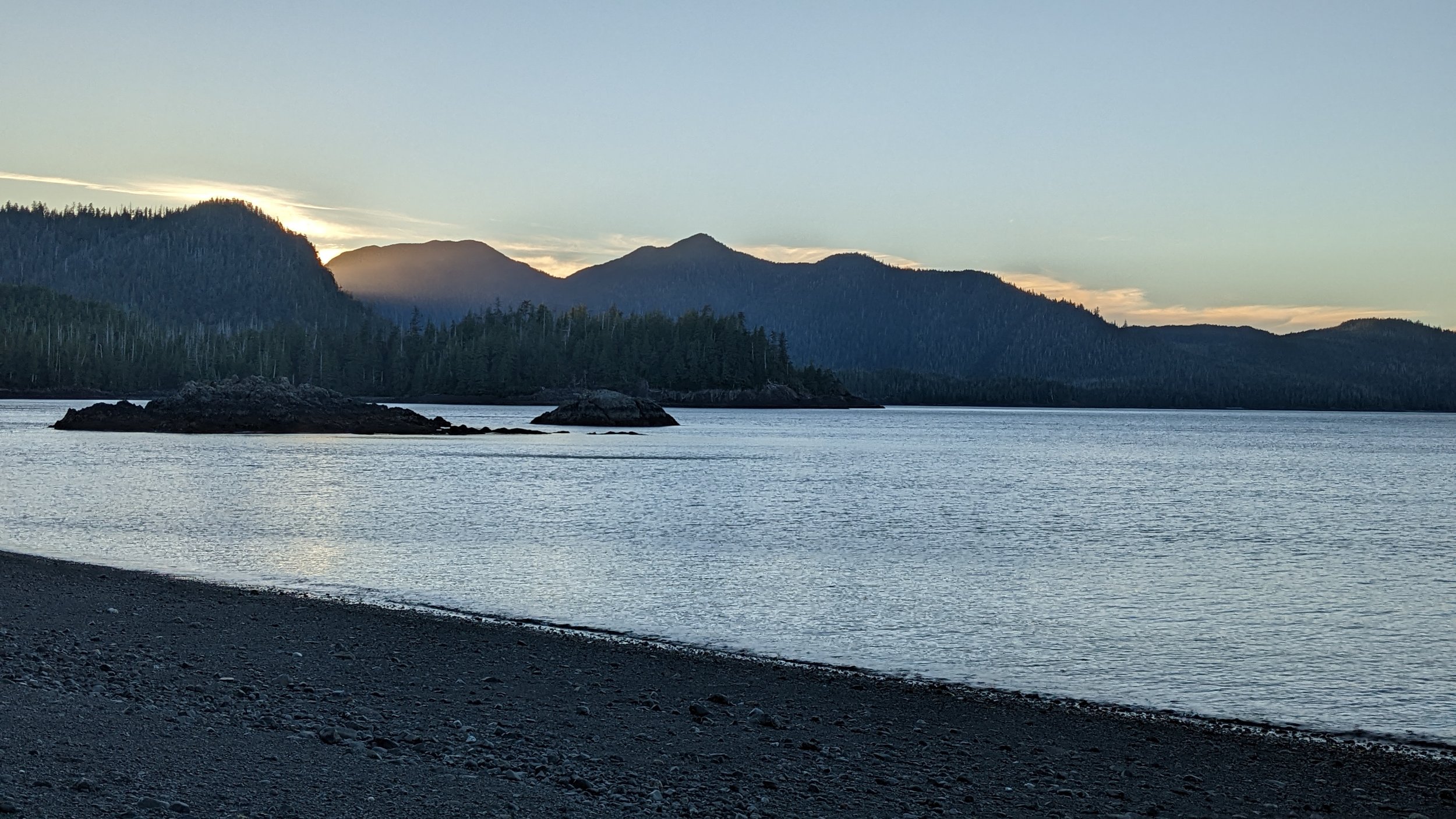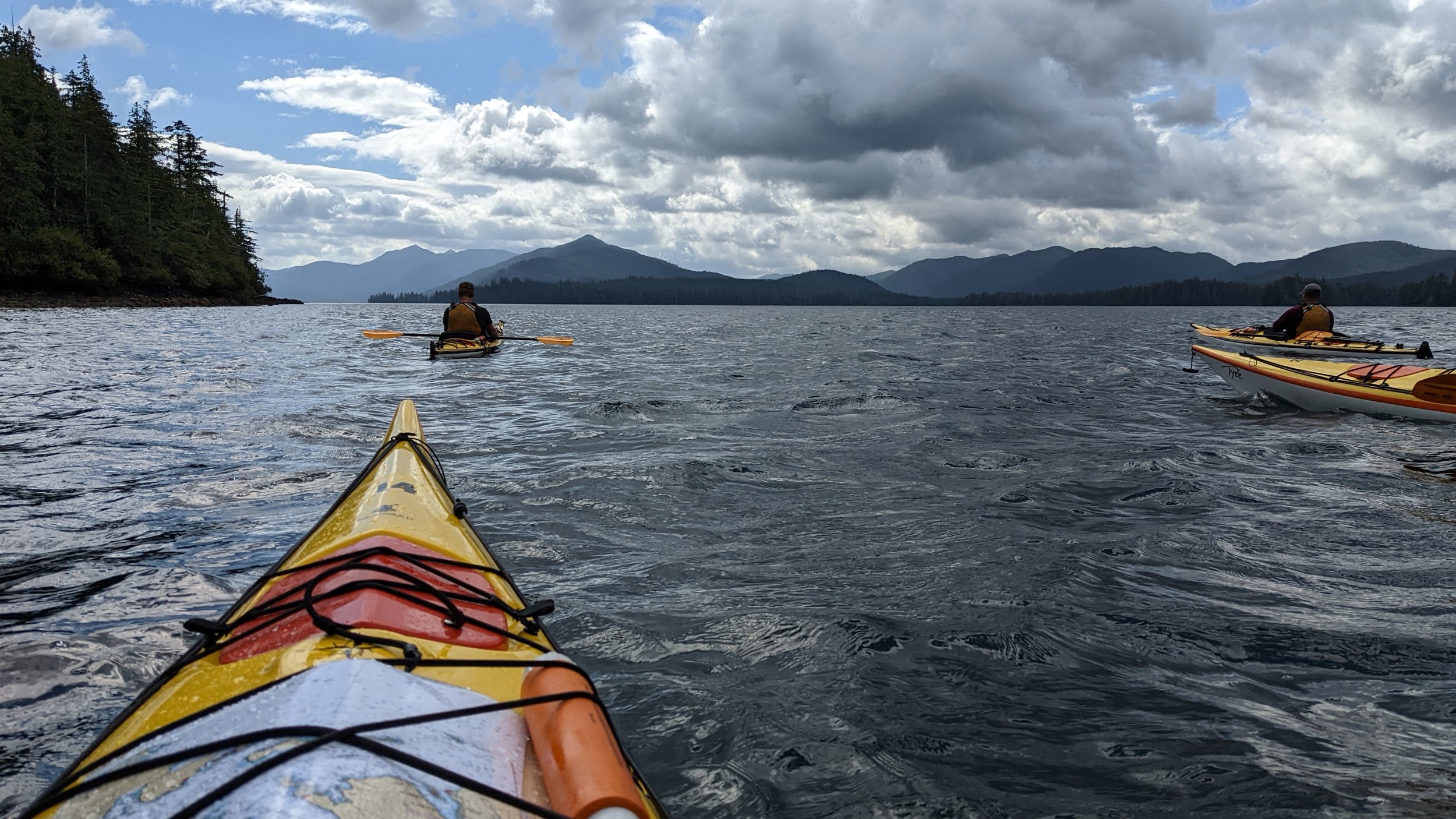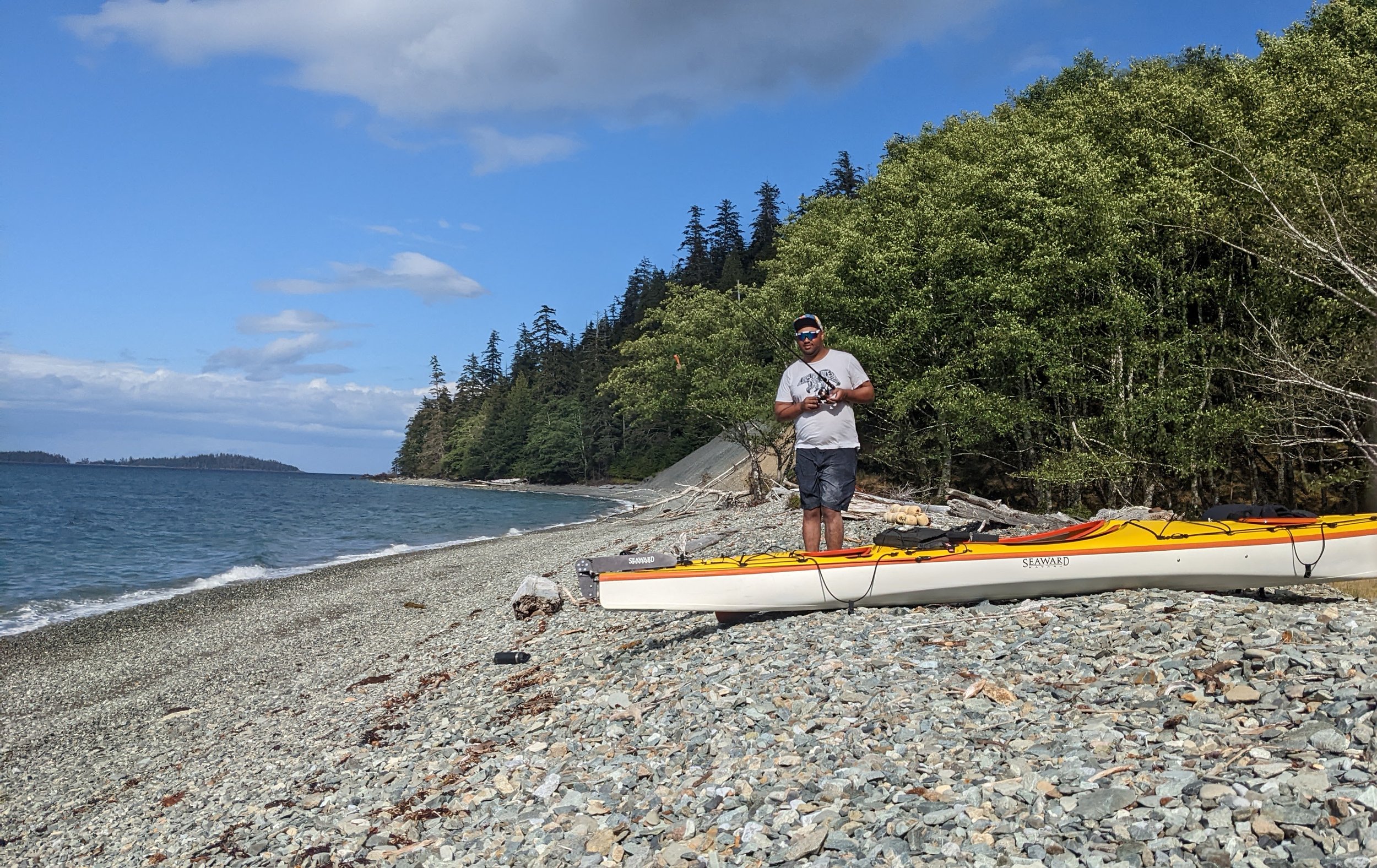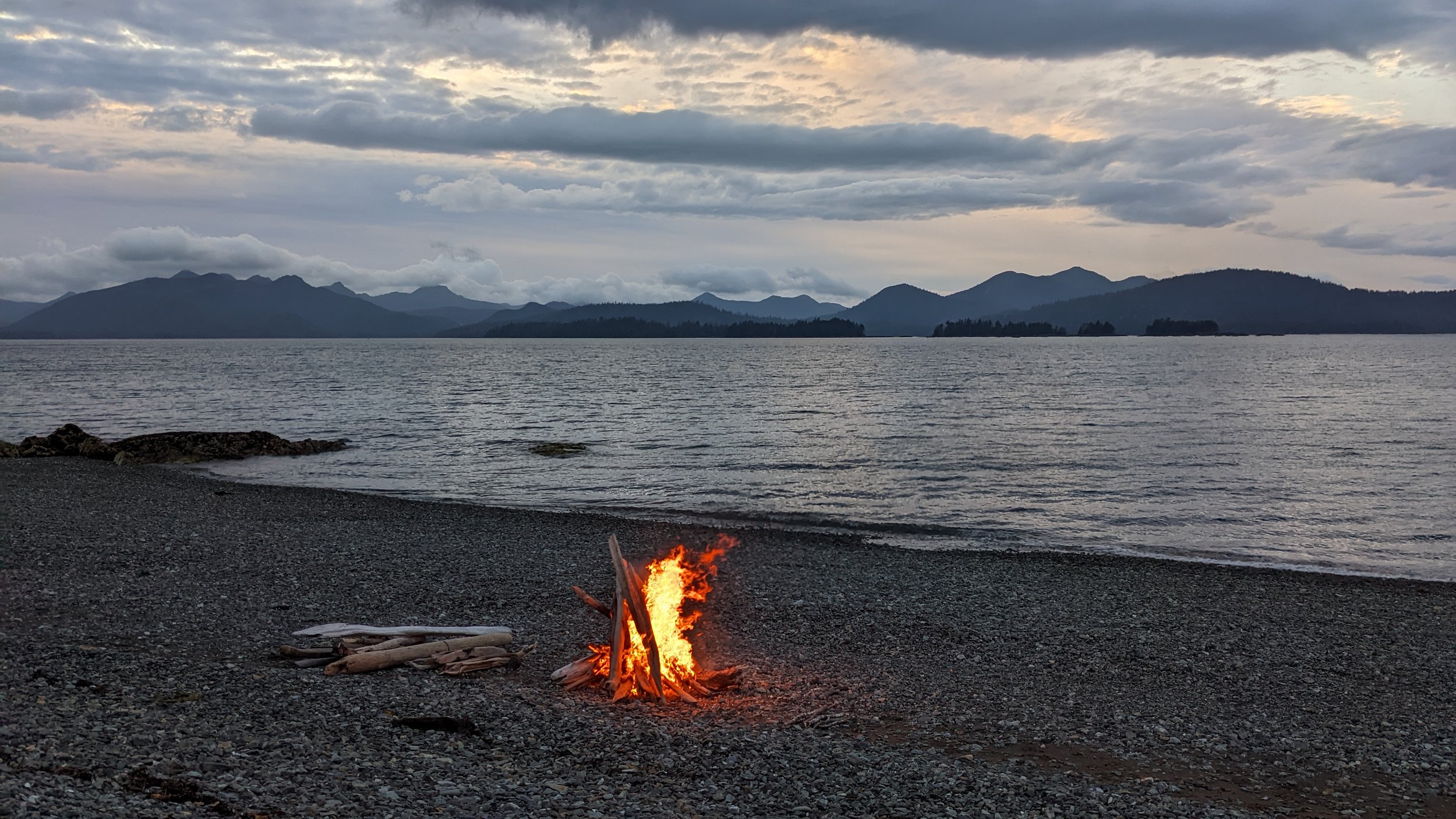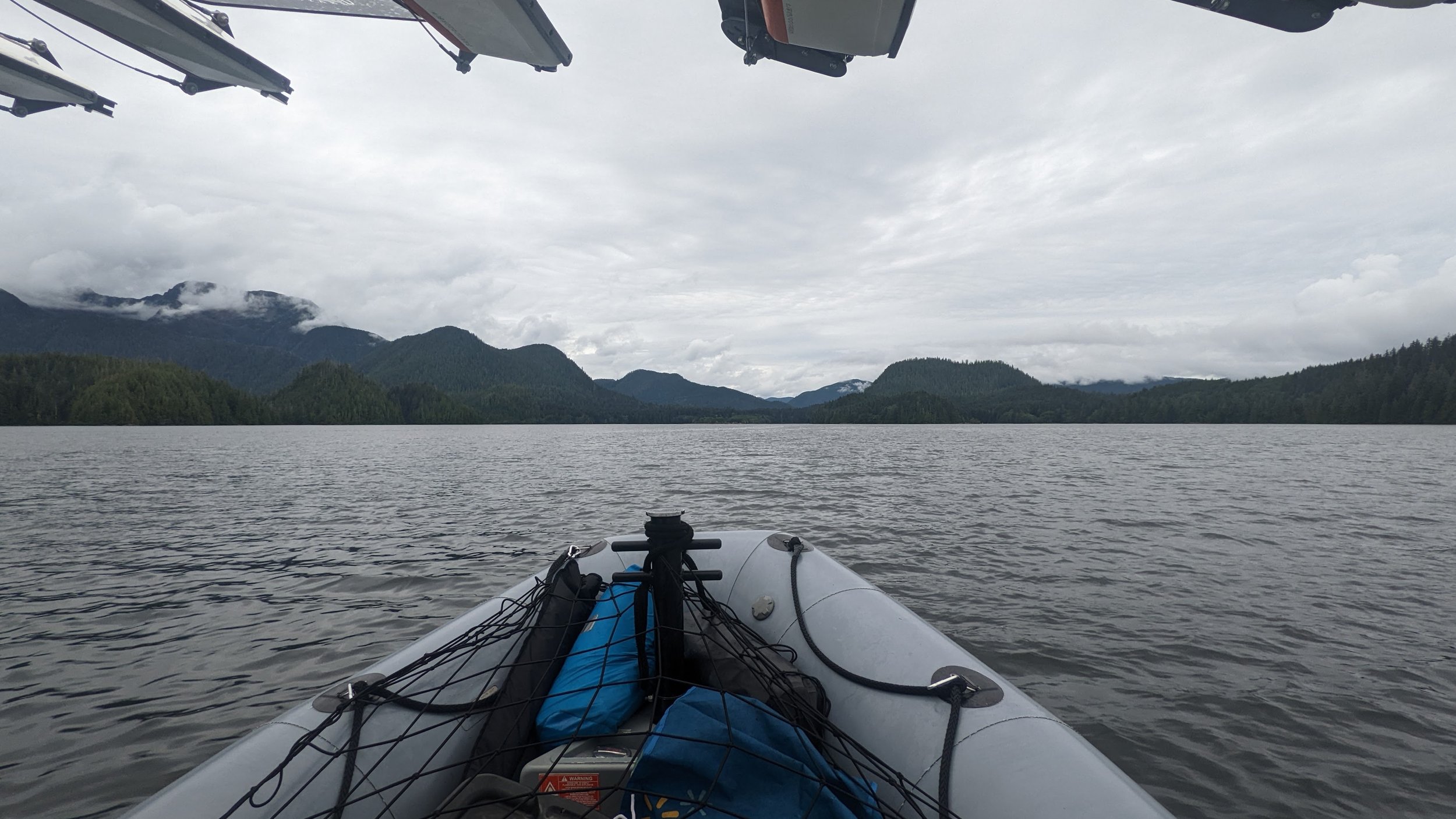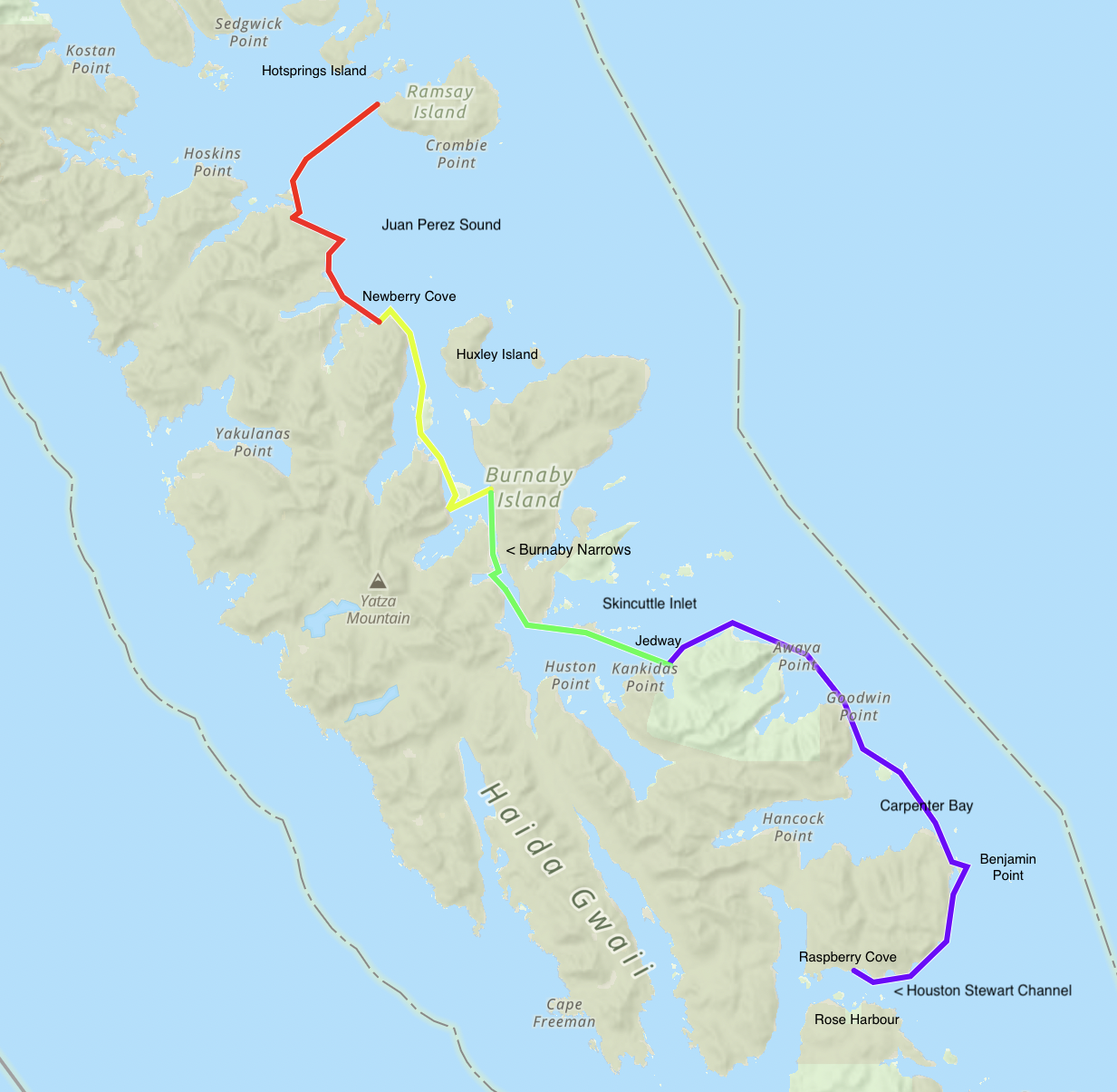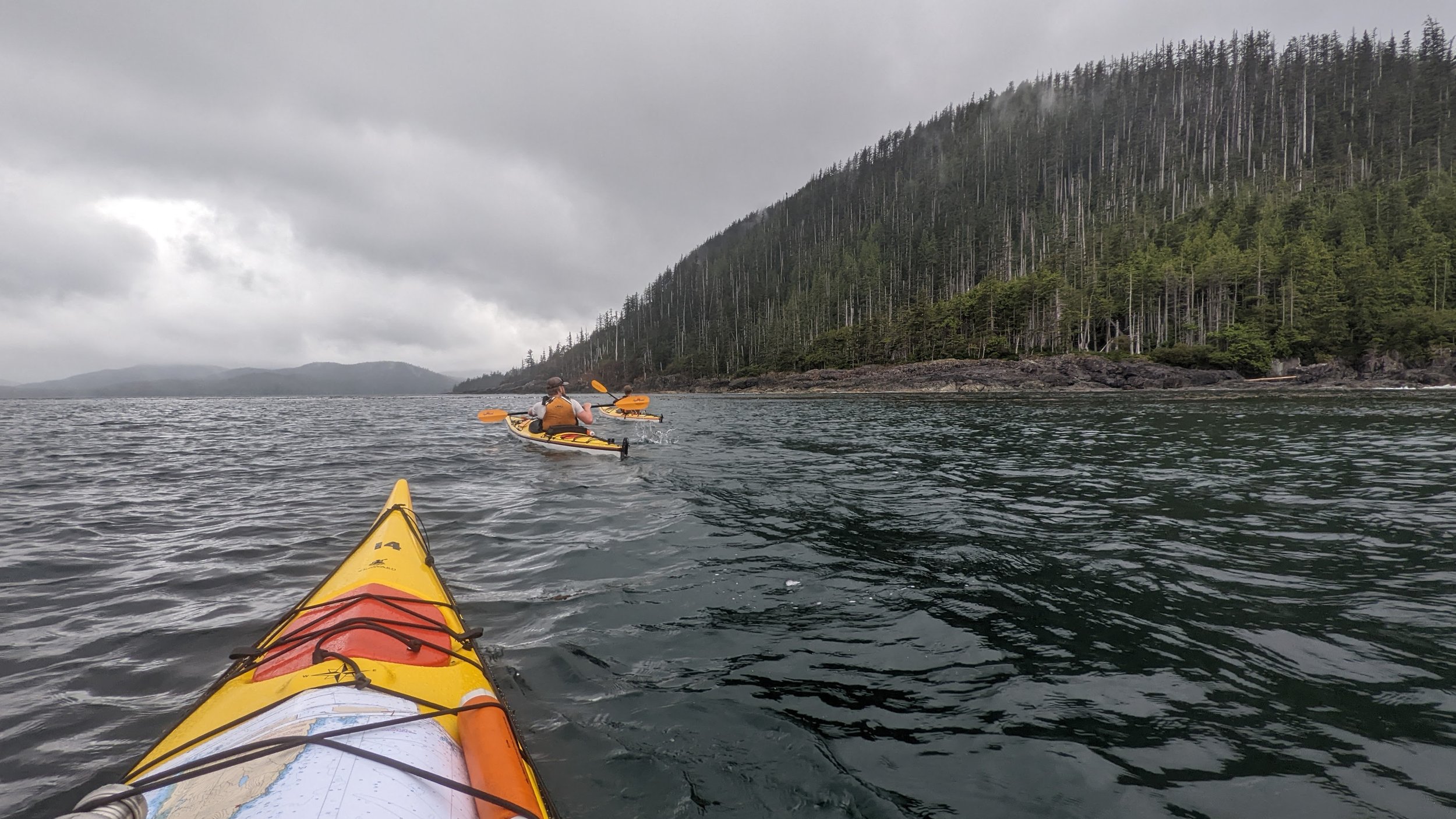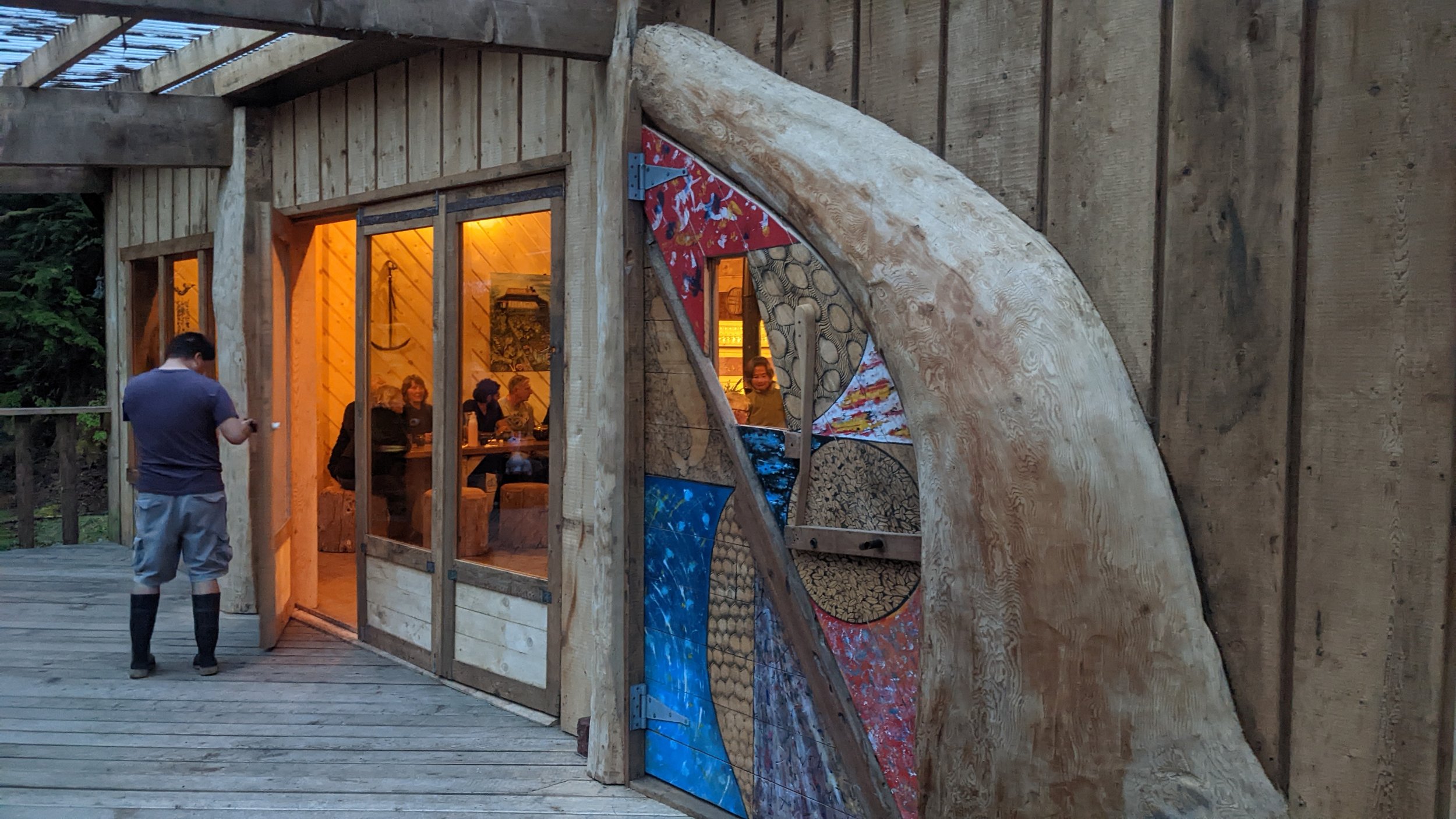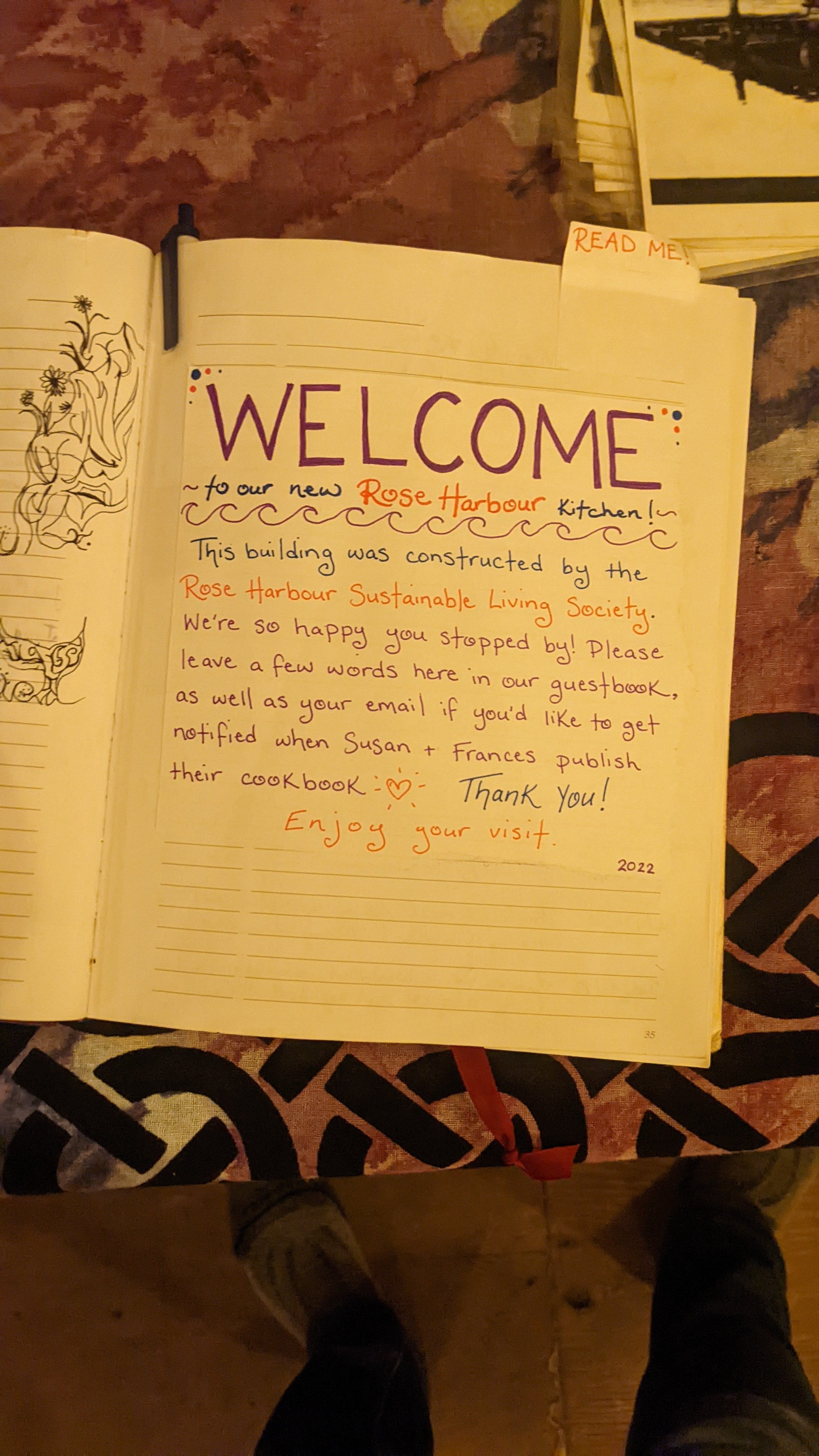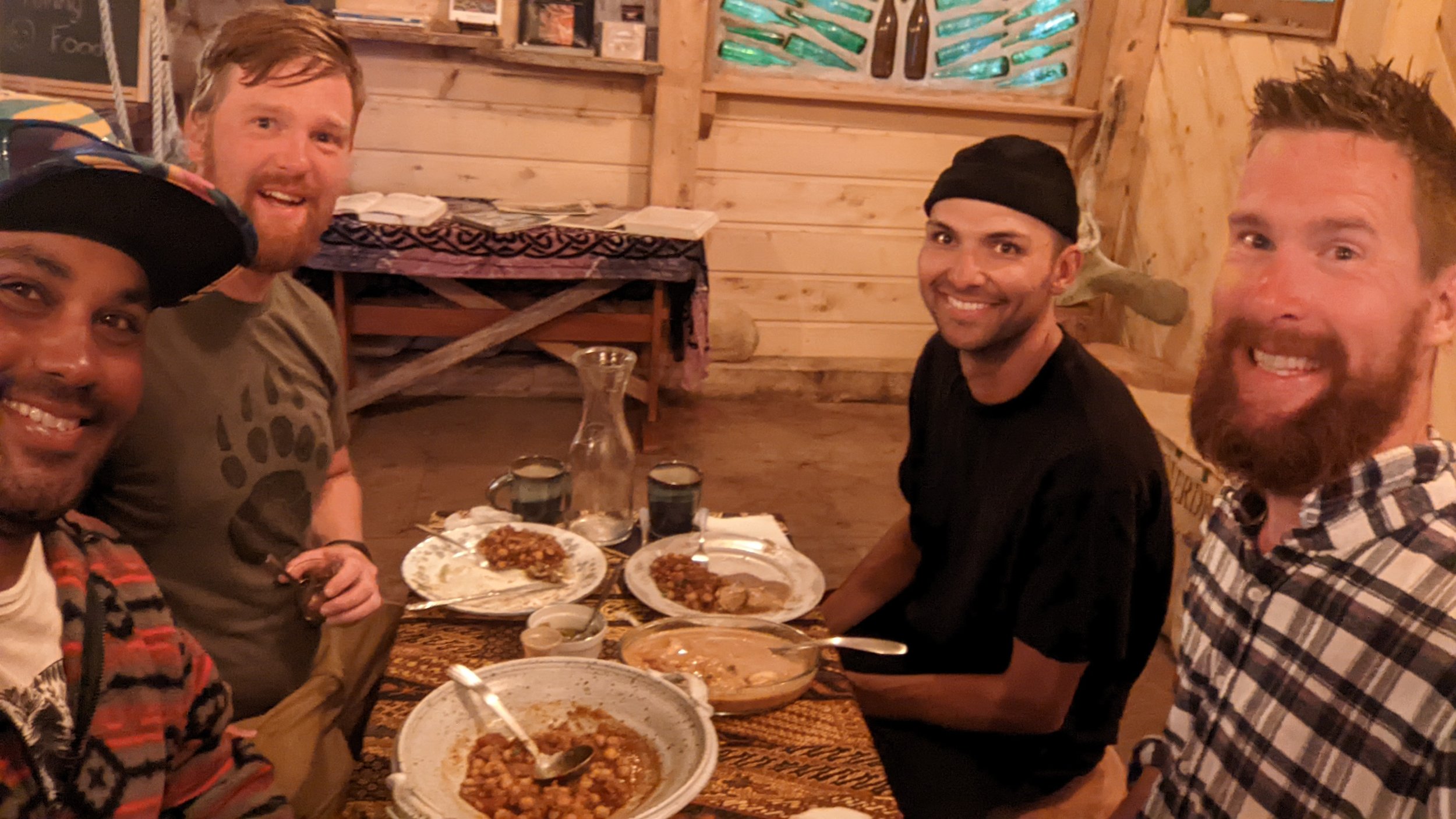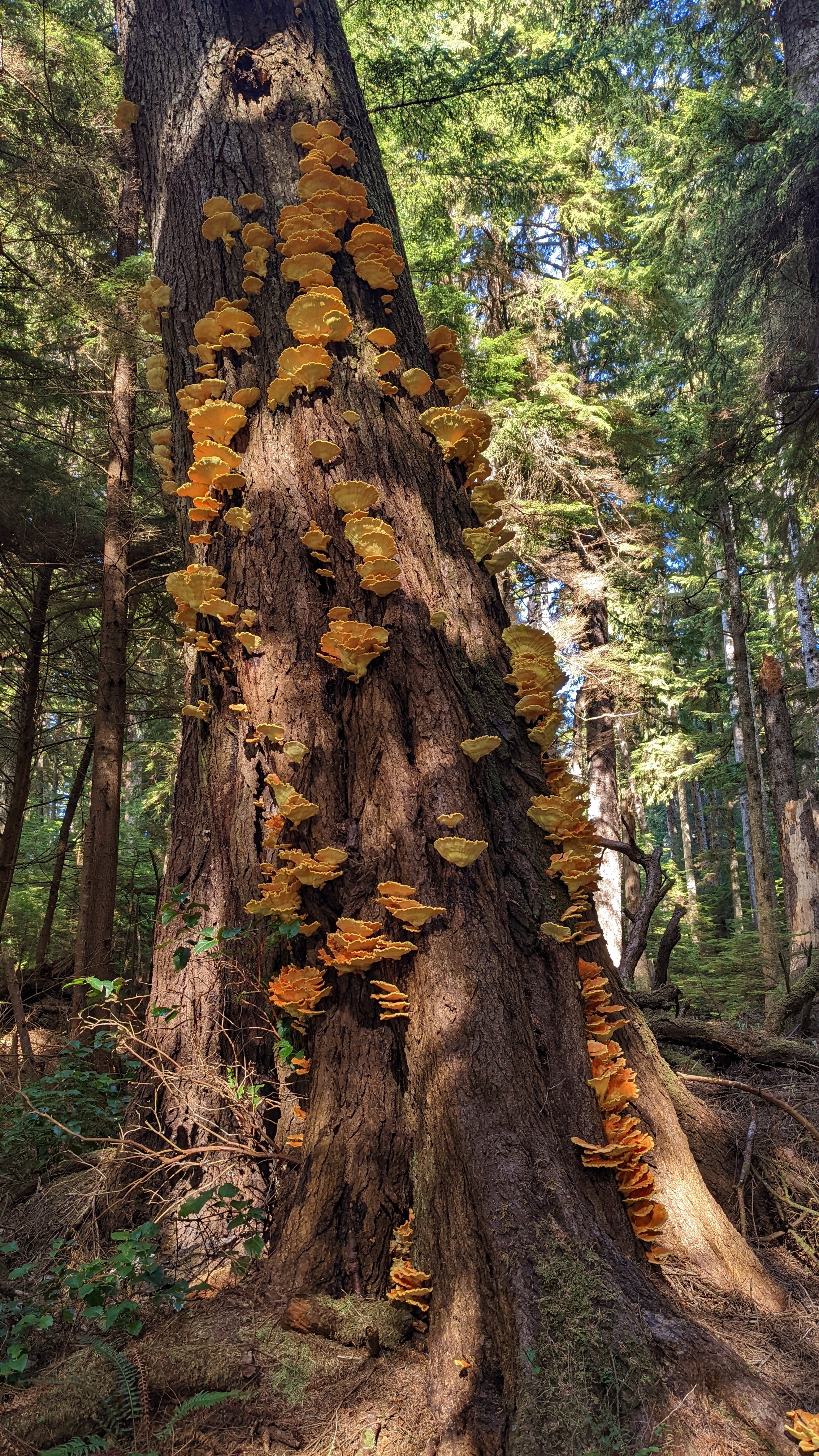Kayakaing Gwaii Haanas National Park
Every year it gets harder to find a trip that evades cell signal. They’re adding towers faster than I can book adventures.
So when I stumbled upon Gwaii Haanas National Park on Haida Gwaii in 2019, and was promised a route that was completely off the grid, I started to get excited. The more I read about the history of this incredible place, the more pumped I got. I started organizing a kayak trip for Summer 2020.
And then something happened…
Our plans to cover 100km of BC coastline got completely derailed by a 0.1 micrometer obstacle. Trip planning went on hold, routes became local, and Gwaii Haanas became a distant dream. It wasn’t until August 2022 that we brought that dream back to life.
The Route
The starting point of our trip, the town of Sandspit on Moresby Island, is closer to Alaska than it is to Vancouver Island. There are only two ways in: air or sea. You can fly from Vancouver on a two hour once-a-day flight, or take the seven hour ferry from Prince Rupert.
Once you’ve arrived in Sandspit, you’re only a hop (one hour van taxi on logging roads), skip (two hour zodiac shuttle), and a jump (off the side of the boat to your campsite) to Gwaii Haanas. From there, you have 1700km of coastline and over 100 islands to explore.
Haida Gwaii and Gwaii Haanas have a fascinating, inspiring history. We have the Haida Nation to thank for fighting so hard to protect it. I recommend reading All That We Say Is Ours by Ian Gill before or during your trip. It’s an excellent view into the contemporary history of the Haida and will give you lots of context on the various places you’ll end up visiting. There’s a mandatory orientation to complete in order to access the park, which gives you a rich history as well.
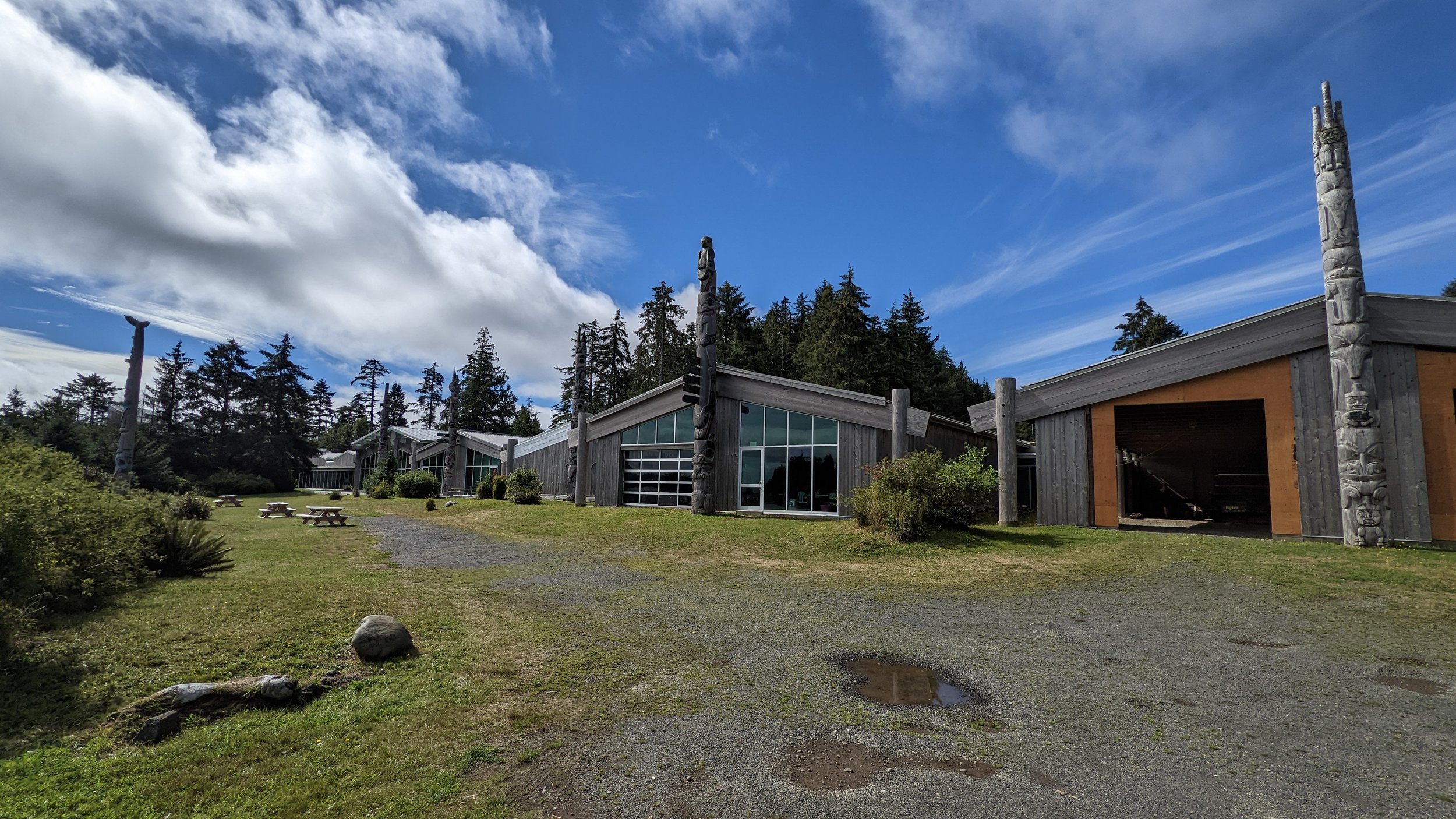
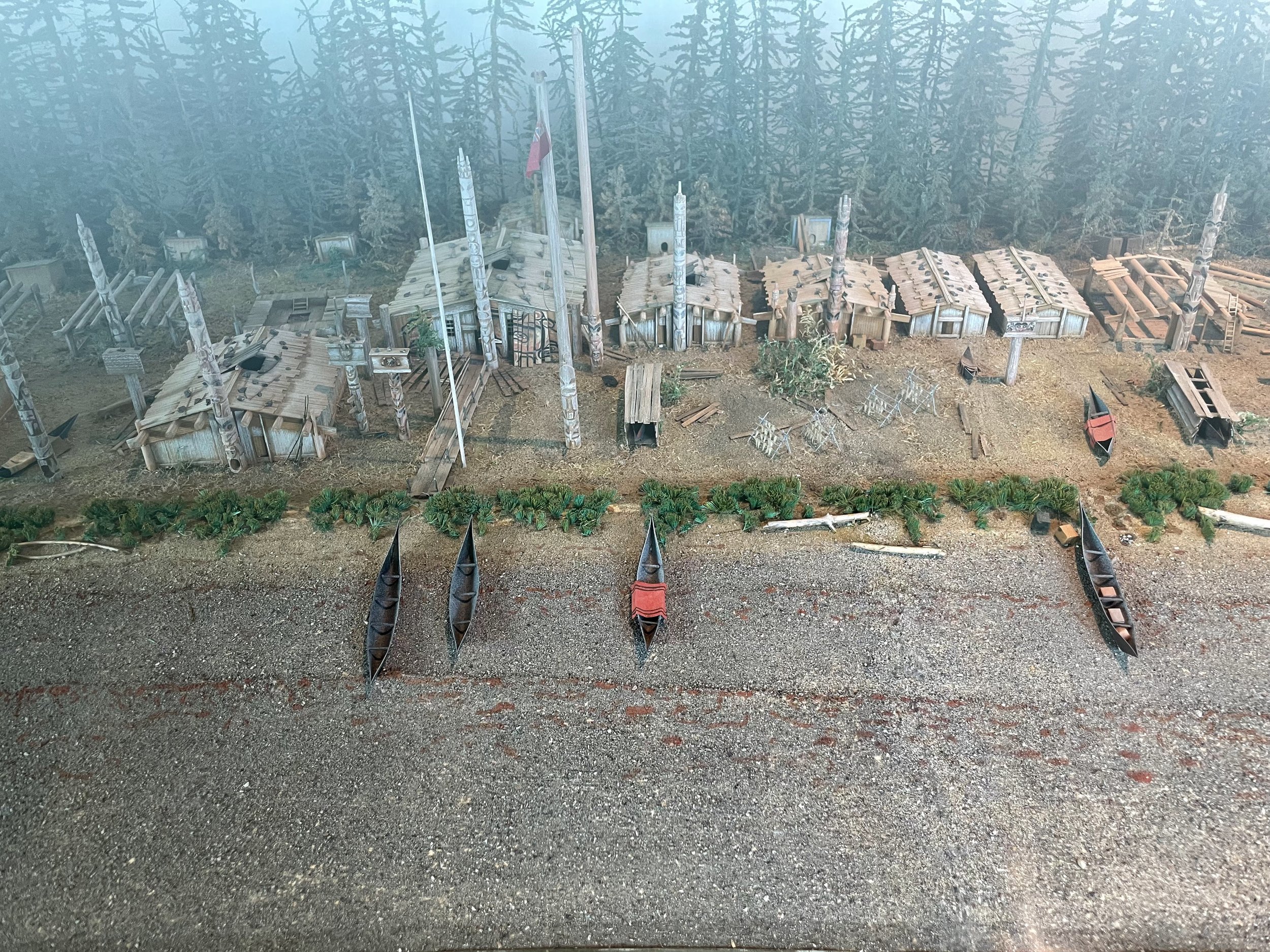

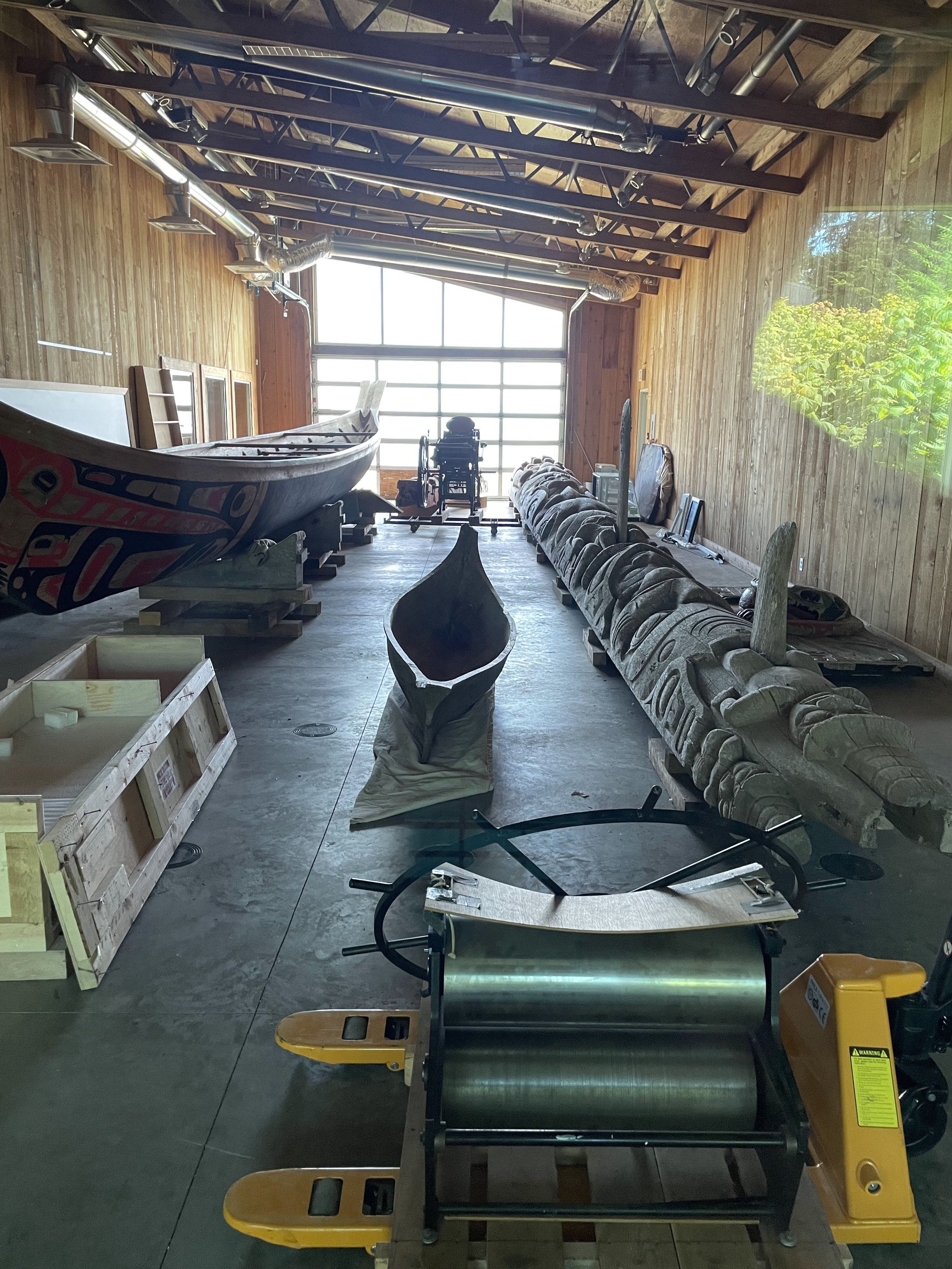
We had a plan in mind but were advised that weather will ultimately decide our direction and distance. Being so close to the open Pacific coast, winds can pick up fast and make large crossings dangerous if not impossible. Luckily, unlike our 2019 route through the Broughton Archipelago, there was little boat traffic to deal with. In fact there were only 30 permits out in the whole park when we visited!
Our route from Juan Perez Sound and around the East side of the islands. Download the GPX file here.
Assembling nautical charts of our route.
The route we designed would take us from Ramsay Island down to Rose Harbour over seven days and close to 100km. This would give us a sampler pack of everything you’d expect to find in the park: open water, quiet bays, mountains, wildlife and, if we’re lucky, a couple of Watchmen sites. It also allowed a few storm days which (spoiler) we needed.
Ultimately we spent four days on the water, three days windbound in Rose Harbour, with two days on either side of the paddle for arrival/shuttling. Even with all we saw, it’s obvious we’ve barely cracked the surface of everything that Gwaii Haanas has to offer.
The Trip
This is not the kind of trip you can execute on your own. Even with stacks of information available, we leaned on tons of support from Moresby Explorers. MorEx mostly outfits guided trips and tours inside Gwaii Haanas. But they’ll also happily rent kayaks, offer shuttles, and set visitors up with a basecamp at their Seaport B&B in Sandspit before and after their self-guided trips too. They’re knowledgable, coordinated, and were instrumental in getting us on/off the water. Cannot recommend them enough.
Knowing our trip would be so dependent on weather, we kept our starting point flexible until the last minute. Our MorEx shuttle dropped us right at our first campsite on Ramsay Island, which happened to be a short paddle from the Hotspring Island Watchmen Site in Juan Perez Sound. (This last part was not a coincidence…).
The view of Juan Perez Sound from our site on Ramsay Island.
I was slightly nervous about this site, because it would leave us a 7km open water paddle across Juan Perez Sound the next morning - something that would be damn near impossible if the weather wasn’t right. But the forecast had us feeling optimistic so we settled into our site on Ramsay before making a visit to the Watchmen and enjoying a long soak in hot pools scattered across the island. I’d heard this can be a high-traffic spot, but we were lucky to have the place to ourselves.
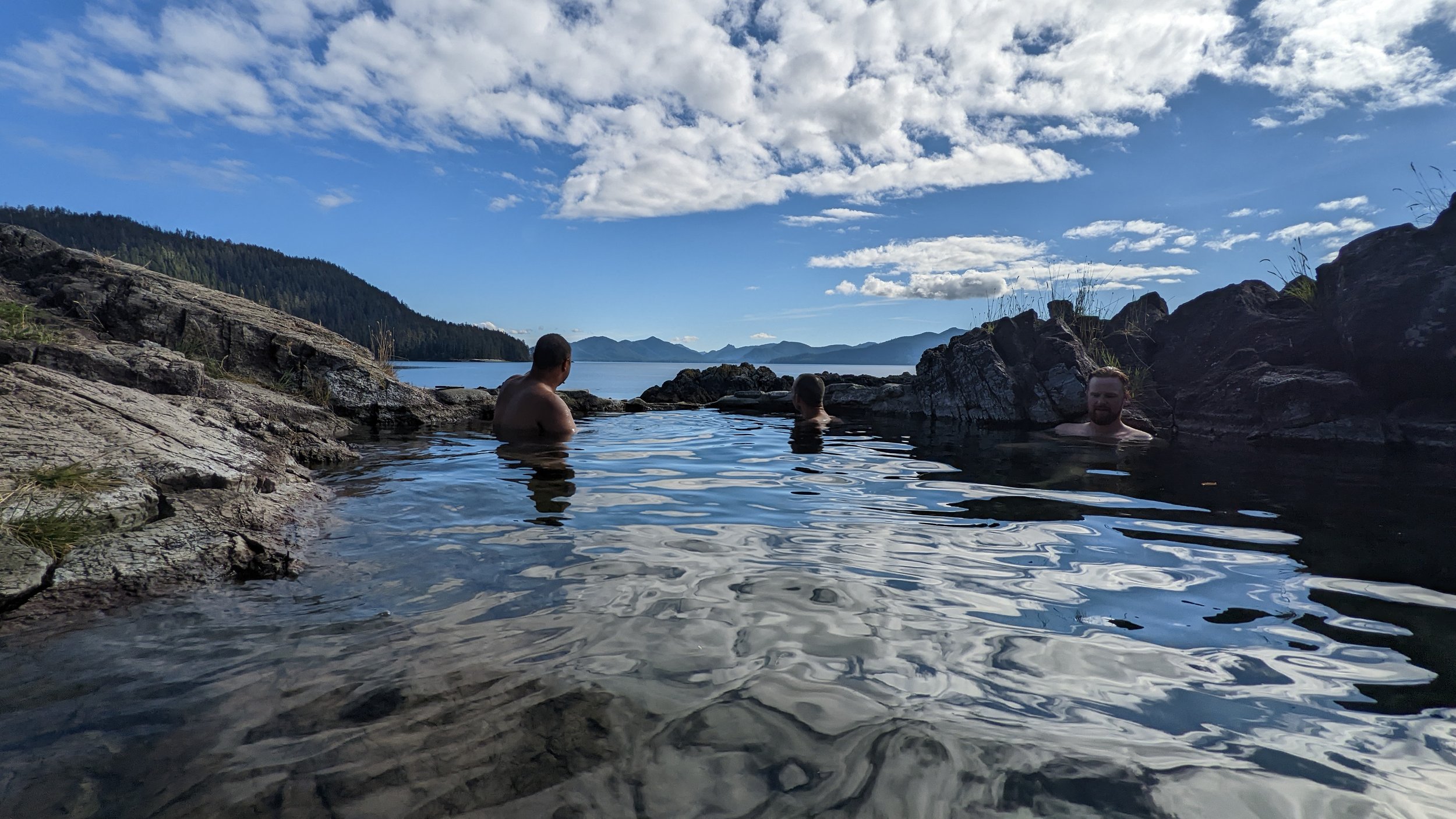
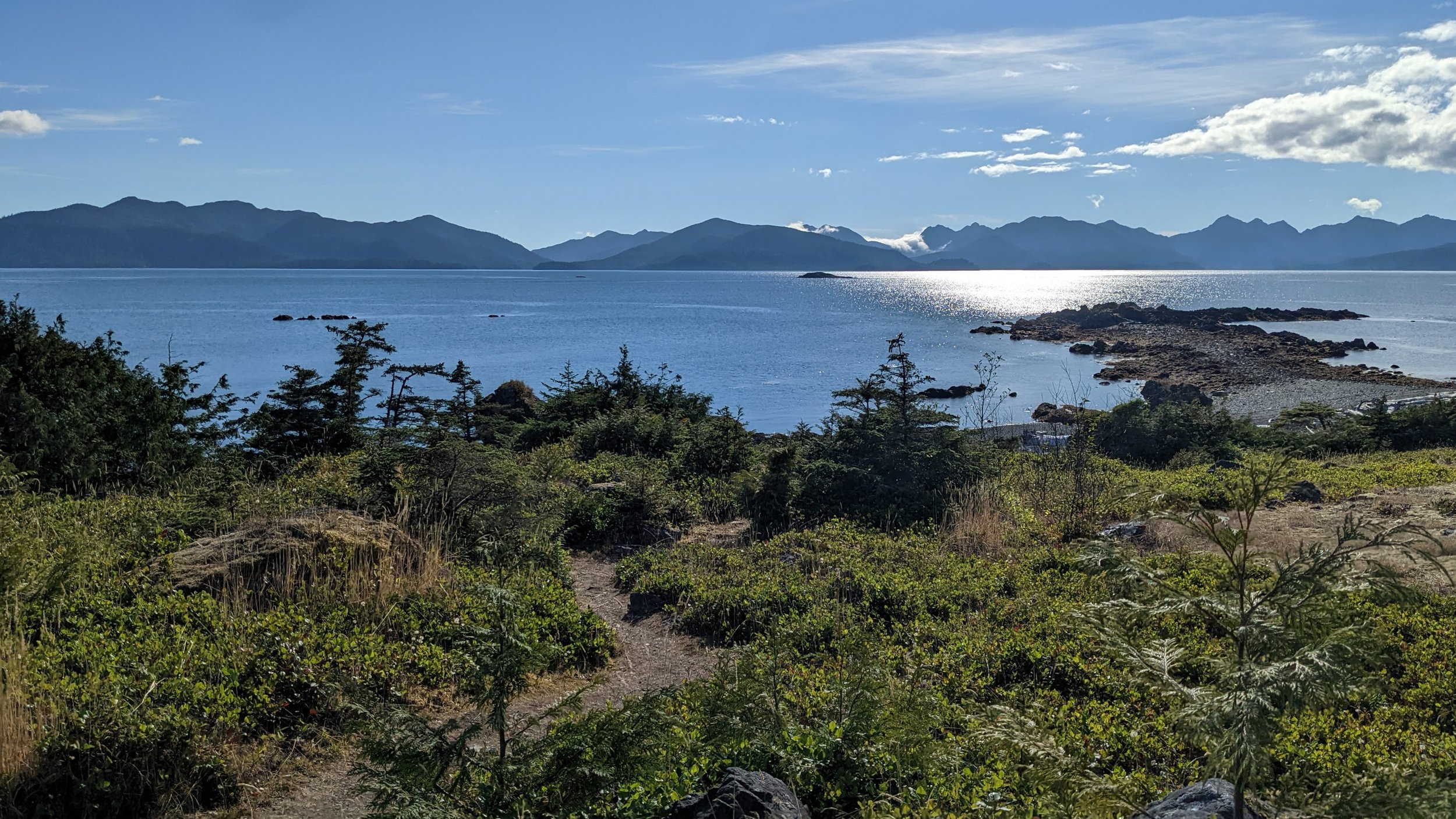
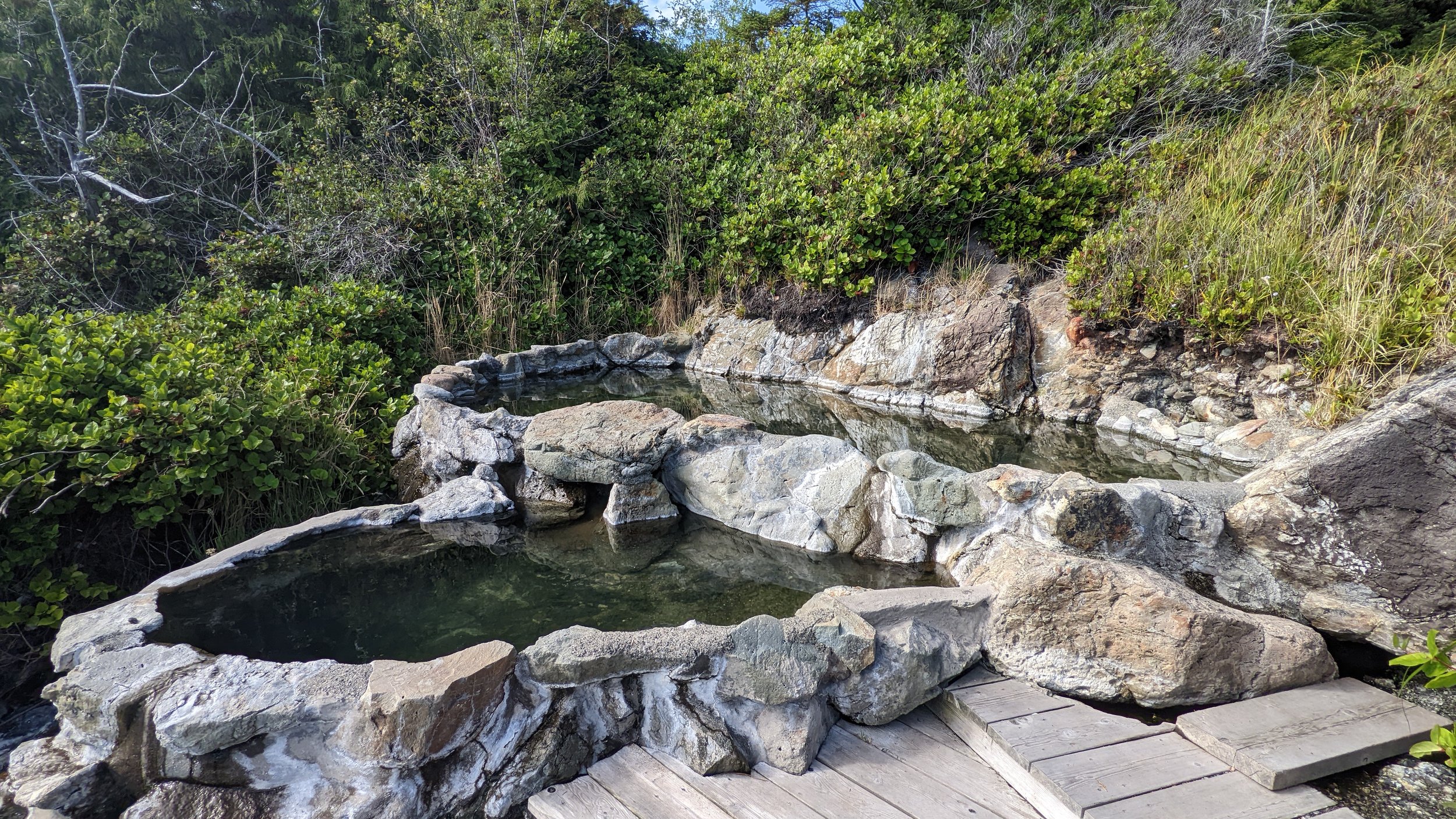
In the morning we found calm water waiting for us on our paddle towards Newberry Cove. We stopped for lunch in a quiet bay south of Marco Island (which would have been an amazing campsite) and headed on for Newberry with humpbacks and sea lions popping up along our path. We arrived at our site just as the tide was coming in, and enjoyed a beautiful sunset and a driftwood campfire before falling asleep nestled in the cove’s old growth forest.
Our cozy campsite at Newberry Cove. We didn’t need an axe/saw and could just collect driftwood off the beach for our nightly fires.
We had big dreams of hiking Yatza Mountain from Island Bay the next day, but the cloud cover wouldn’t burn off long enough to make the summit. So we switched courses and found a beautiful site on the West side of Burnaby Island, just north of the narrows.
Everything is deceptively far away in Gwaii Haanas. What looks like a short paddle across the bay will usually take twice as long as you’d think - because the trees are so big, they give the illusion of being closer than they are.
Clouds capping over Yatza mountain, with the open Pacific just on the other side.
It was on our paddle the following day, from the Burnaby Narrows to Jedway, that we watched the weather start to change. As we passed Bag Harbour surrounded by Risso’s dolphins, the wind started to pick up and gave us a hairy crossing over Skincuttle Inlet. By the time we arrived at our campsite in Jedway, we were watching 20km/hr winds capping in the bay and feeling thankful we’d reached our site!
The site at Jedway (marked as Funter Point) is an old mining camp slowly reforesting itself with wild grasses and alder. As we sat on the rocky beach listening to the radio weather reports, we made some swift adjustments to the tail end of our trip.
Kicking back at Jedway, watching the distant weather start to shift.
Where we had originally planned the last bit of our journey into two paddle days (Jedway > Carpenter Bay > Rose Harbour), we decided to compress the two days into one. We wanted to beat the weather to Rose Harbour, which would help us avoid setting up camp/tearing down/paddling in a storm.
I don’t recommend doing this route in one day.
It’s 33km and, with variable weather/tides, can be pretty gnarly. But other than a choppy riptide coming into Houston Stewart Channel, we got lucky and managed to beat the storm after all - settling in at Raspberry Cove.
A proper foggy, drizzly BC paddle along the east coast of Moresby Island.
The other reason we wanted accelerate this leg of the trip is because Courtenay at MorEx had coordinated with the Rose Harbour Kitchen to prepare a table for us for dinner. The Kitchen does dinner a couple days a week for MorEx tours, and curates a multi-course, locally-sourced feast for weary travellers who have made it to the end of the continent.
This was insanely luxurious, especially after a few days in the woods. It was like finding an oasis. Don’t underestimate the paddle from Raspberry Cove to Rose Harbour, especially at dusk, but also don’t miss the opportunity to enjoy a Michelin-worthy culinary experience.
Having beat our planned route into Rose Harbour, we holed up in Raspberry Cove for the next three days. It rained non-stop for the first two, and the winds held us back from visiting the famous Watchmen site at SGang Gwaay. We spent our time hiking along game trails through old growth, playing cards, and finishing the last of our wine.
Hiking and foraging along the game trails behind Raspberry Cove.
On our final day, we were picked up by D’Leen (a MorEx legend) who shuttled us back along the route we’d just paddled, along the outer coast of the park for a brief visit at the Windy Bay Watchmen site, and then back to the Seaport B&B to dry out and reflect on an incredible trip.
General stokedness on our five-hour shuttle back to basecamp.
Itinerary (download the GPX here)
Day 1: Shuttle to Ramsay Island from Moresby Camp (2.5 hours)
Day 2: Ramsay Island to Newberry Cove (17km)
Day 3: Newberry Cove to Burnaby Narrows (15km)
Day 4: Burnaby Narrows to Jedway (16km)
Day 5: Jedway to Rose Harbour (33km + 4km return from Raspberry Cove<->Rose Harbour)
Day 6-7: Stormed in at Rose Harbour!
Day 8: Shuttle back to Moresby Camp (5 hours)
The Food
Getting outfitted with food for this trip was both simple and complex. Simple in that there is one grocery store on Moresby Island (the Sandspit Super Valu). Complex in that we had to assemble our shopping list ahead of time and send it over to Dean at Super Valu to do our picking for us.
Dean and his team were amazing and got everything prepared for us for when we arrived. If you need your ingredients picked, give them a call. Feel free to make a copy of this ingredients spreadsheet to assemble your shopping list!
On this trip, we tried to limit meats and aim for single pot meals. Some of the highlights included:
Cheesy Pesto Pasta. Egg noodles, pesto sauce, shredded cheese, and nutritional yeast.
‘Pizzaritos’. Pizza ingredients (onion, peppers, salami, cheese) chopped up and wrapped in a tortilla, and roasted over the grill on the fire.
Lentil Sloppy Joes. Red lentils, black beans, onion, green pepper, powdered sloppy joe mix, served on a bun.
Pro Tips
Read. A lot. Gwaii Haanas doesn’t have formally maintained campsites, and you can camp pretty much anywhere as long as it’s out of sight and sound of anyone else. You’ll want to pick up books and maps to help plan your route. We also recommend Nancy Turner’s Plants of Haida Gwaii, but remember that visitors shouldn’t be picking vegetation in the park.
If you’re intending to visit the villages of Daajing Giids or Skidegate, just know that they’re operating on island time. Stores/restaurants are only open certain days of the week and only at certain times. And Google might not be accurate. If there are things you really want to do, call ahead and organize around availability. Highly recommend calling Roberta, who runs Keenawaii’s Kitchen in Skidegate, for an amazing locally sourced home-cooked dinner.
Depending on rainfall, some water sources may be hard to find or non-existent. Bring a container big enough to last you at least a few days. Look for creeks at the end of bays, and where valleys cut between the mountains.
Consume weather reports with a grain of salt. Depending where you are in the park, you will likely find circling winds and very confused waves. Tides generally flood South to North, but this isn’t always the case.
Leave. Yourself. Wind. Days. Mentally prepare to use them. Revisit your routes nightly and be flexible with changes on the fly.
